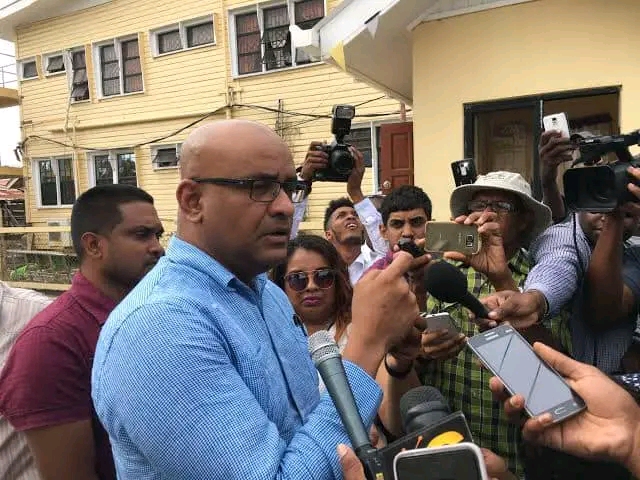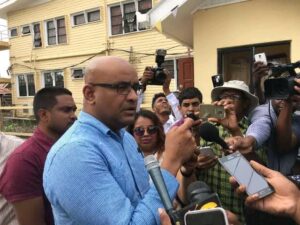
Corruption Allegations Lead to FBI Interrogation of Guyana’s Vice President Bharrat Jagdeo, Findings Revealed

In a significant development that has captured international attention, Bharrat Jagdeo, the Vice President of Guyana, has been interrogated by the Federal Bureau of Investigation (FBI) as part of an inquiry into corruption allegations. The allegations stem from Jagdeo’s active involvement in the country’s burgeoning oil sector and raise questions about governance and accountability in the face of a rapidly changing economic landscape.
Background on the Allegations
Jagdeo, a seasoned politician who served as President from 1999 to 2011, has come under scrutiny as Guyana experiences an unprecedented oil boom. The country, once regarded for its rich natural resources but struggling economy, has transitioned into a potential oil powerhouse following ExxonMobil’s discovery of substantial offshore oil reserves. This newfound wealth has attracted significant foreign investment, but it has also raised concerns about transparency, potential corruption, and the management of resource revenues.
Allegations against Jagdeo are centered on claims of nepotism, misallocation of contracts, and unverified dealings in which he is allegedly entangled. The FBI’s involvement, which is relatively uncommon in Caribbean affairs, points to the seriousness of the claims and the broader implications for governance in Guyana. The investigation has sparked media speculation, political unrest, and calls for accountability from various quarters, including civil society organizations and opposition political parties.
The FBI’s Inquiry
While details of the FBI’s investigation have not been fully disclosed, reports indicate that agents have been gathering evidence concerning Jagdeo’s role in awarding contracts to certain companies in the oil and gas sector. The inquiry reportedly includes interviews with several whistleblowers and industry insiders who claim that Jagdeo’s actions may have violated both local and international anti-corruption laws.
The interrogation took place against a backdrop of heightened scrutiny of political elites in resource-rich nations, where the phenomenon of “resource curse” often leads to corruption and mismanagement. The FBI’s involvement raises questions about the integrity of Guyana’s political structure and its ability to manage its burgeoning wealth responsibly.
Political Ramifications
The fallout from the allegations and subsequent FBI interrogation has stirred significant political tensions in Guyana. Jagdeo’s party, the People’s Progressive Party/Civic (PPP/C), has rallied in his defense, dismissing the charges as politically motivated and an attempt to undermine the government. However, the opposition parties, particularly the A Partnership for National Unity + Alliance for Change (APNU+AFC), have seized the opportunity to criticize the administration and call for a full and transparent investigation.
The political atmosphere has become increasingly charged, with calls for Jagdeo to step aside pending the outcome of the investigation. Civil society organizations have also weighed in, claiming that accountability is essential for the health of Guyana’s democracy and that the oil boom must benefit all citizens rather than enriching a select few.
Findings and the Path Forward
As the FBI continues its inquiry, the findings from this investigation could have far-reaching implications for governance in Guyana. Should substantial evidence of corruption materialize, it could lead to significant changes within the current administration. Anti-corruption advocates are hoping for a clearer framework for monitoring public officials’ actions in the context of the oil sector. The situation has become a rallying point for demands for greater transparency and governance reforms in the country.
Moreover, irrespective of the outcome of the investigation, this episode underscores the importance of establishing robust institutions capable of overseeing the management of natural resources. The Guyanese government must prioritize transparency, accountability, and the involvement of civil society to safeguard public trust and to ensure that oil wealth is channeled into sustainable development initiatives.
Conclusion
The FBI’s interrogation of Vice President Bharrat Jagdeo marks a crucial moment in Guyana’s political landscape. As allegations of corruption arise amidst the country’s oil boom, the government faces the pressing challenge of maintaining public confidence and ensuring ethical governance. The investigations will be closely watched, not only for their immediate implications for Jagdeo but also for their impact on broader governance practices in Guyana. The lessons learned may very well determine how the nation manages its newfound wealth and sustains its democratic institutions in the years to come. The road ahead demands rigorous oversight, open dialogue, and a commitment to ethical governance to prevent the pitfalls encountered by many resource-rich nations globally. As the situation unfolds, one thing remains clear: accountability and transparency will be paramount as Guyana navigates this transformative period in its history.





